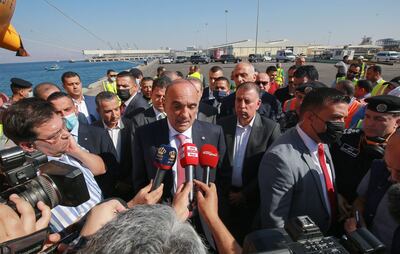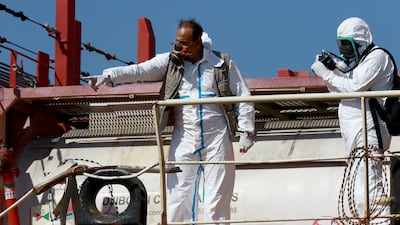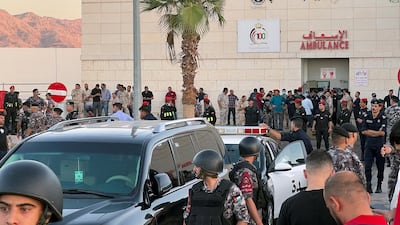Prime Minister Bisher Al Khasawneh announced on Tuesday that Jordan's city of Aqaba was “totally safe” after a chlorine gas explosion at its port killed 13 people.
There were fears that the gas released in the blast, which occurred on Monday at the shipping terminal close to the Saudi border, would spread to residential areas.
The explosion was one of Jordan's worst accidents in recent years. A flash flood near the Dead Sea in 2018 killed 21 people, most of them pupils on a school bus.
The prime minister said all roadblocks had been removed from Aqaba and air quality tests had shown there was no danger in the atmosphere.
“The area has become totally safe,” Mr Al Khasawneh said. “Specialists have told us that there is no longer any danger of a chlorine gas spread.”
The explosion also injured 250 people and overwhelmed hospitals in the city of 188,000 people, the local health department said.
“The wind was starting to blow into Aqaba but luckily it changed direction,” Hadi, a diving instructor in Aqaba, told The National by phone.
Authorities advised residents to remain indoors and close their windows.
State television quoted King Abdullah as saying that authorities should make the results of their investigstion public.
The king said "it is necessary to point out the errors and hold those negligent accountable according to the law."
Tuesday's disaster occurred when a large chlorine gas tank that was being loaded by crane on to a vessel in Aqaba fell by the dockside and exploded in a plume of yellow smoke, video footage released by authorities showed.
The footage showed workers around the crane trying to flee as several lorries carrying chlorine cylinders were waiting their turn to approach the ship.
Officials said the cylinder contained about 25 tonnes of chlorine gas destined for export to Djibouti. The office of the attorney general in southern Jordan said on Tuesday that it had started an investigation into the explosion and added that five of the 13 victims were foreign citizens.
Chlorine gas is so deadly that it is regarded as a chemical weapon.
The Syrian airforce was suspected of using chlorine gas in an attack on the rebel town of Saraqib in 2018, the Organisation for the Prohibition of Chemical Weapons reported.
The US Centres for Disease Control classifies Chlorine gas as a lung-damaging agent and says it is “highly corrosive when it contacts moist tissues such as the eyes, skin and upper respiratory tract”.
The explosion occurred as Aqaba and other tourist sites in Jordan are seeking to recover from a sharp fall in visitors caused by the coronavirus pandemic. In addition to the Red Sea, many tourists use Aqaba as a base to visit the nearby Nabataean city of Petra, which is two hours away.

Jordan has been struggling economically and unemployment is at an official high of about 24 per cent. In the past three years, authorities opened Aqaba up to cheap flights from Europe to promote tourism.
But Aqaba's beaches are small compared to Egypt's and other neighbouring countries and the city is primarily seen as a port from where a large portion of Jordan's trade is handled.
Phosphate, Jordan's main mining asset, is exported through a terminal in Aqaba near the explosion site and grain silos are also situated a few hundred metres away.
Environment Minister Muawiya Al Radaideh said he expected any impact on marine life to be “limited” and confined to seawater “immediately near” the explosion.
Shipping was halted but the port resumed operations on Tuesday, state television said.
Aqaba Governor Mohammad Al Radayaa said the situation had been brought under control.
The government sent a field hospital and medical equipment to the area and at least one plane arrived from Amman to fly out the injured.
The area where the explosion occurred is one kilometre from the Saudi border and 20 kilometres from Israel's southern city of Eilat.
About 50,000 people live in Eilat and a land border connects it to Aqaba.
Local authorities in Eilat said the city was not affected by the explosion. There was no comment from Saudi Arabia on whether any of its territories were affected.
The UAE government stated its regret over the incident, calling it a "tragedy".
Official news agency Wam said the Ministry of Foreign Affairs and International Co-operation had “expressed its sincere condolences and sympathy to the Jordanian government and people and to the families of the victims of this tragedy”.



















